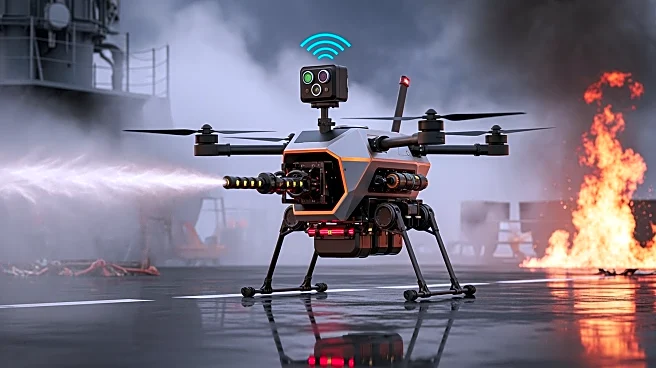What's Happening?
A new AI-based fire suppression system has been developed to autonomously detect and extinguish oil fires aboard naval vessels. This system, created by a research team led by Senior Researcher Hyuk Lee at the Korea Institute of Machinery and Materials,
uses artificial intelligence to determine the authenticity of a fire and targets the fire source directly. The system is designed to handle complex maritime conditions, such as sea waves and ship motion, and has been successfully tested on a vessel. It features fire detection sensors, fire monitors, and an AI-based analysis and control unit, achieving a fire detection accuracy of over 98%. The system has been verified to operate effectively in sea states of 3 or higher and has undergone extensive testing in a large-scale simulation facility.
Why It's Important?
The development of this AI-based fire suppression system represents a significant advancement in maritime safety technology. By accurately targeting and extinguishing oil fires, the system minimizes unnecessary damage and enhances the safety of naval operations. This technology could potentially reduce the risk of catastrophic fires on ships, protecting both personnel and equipment. The system's ability to function under challenging maritime conditions also highlights its robustness and reliability, making it a valuable asset for naval and commercial shipping industries. The successful implementation of such technology could lead to broader adoption across various maritime sectors, improving overall safety standards.
What's Next?
Following successful trials, the research team plans to further refine the system's capabilities and explore its application in other maritime environments. The technology may also be adapted for use in commercial shipping, where similar fire risks exist. Stakeholders in the maritime industry, including shipbuilders and operators, are likely to monitor the system's performance closely, considering its potential integration into existing safety protocols. Additionally, regulatory bodies may evaluate the system for compliance with international maritime safety standards, potentially influencing future regulations.















